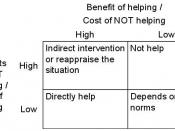Table of Contents1. Introductionâ¦â¦â¦â¦â¦â¦â¦â¦â¦â¦â¦â¦â¦â¦â¦â¦â¦â¦ 22. Literature reviewâ¦â¦â¦â¦â¦â¦â¦â¦â¦â¦â¦â¦â¦â¦â¦â¦ 33. Methodology â¦â¦â¦â¦â¦â¦â¦â¦â¦â¦â¦â¦â¦â¦â¦â¦â¦ 84. Research findingsâ¦â¦â¦â¦â¦â¦â¦â¦â¦â¦â¦â¦â¦â¦â¦â¦ 115. Implicationsâ¦â¦â¦â¦â¦â¦â¦â¦â¦â¦â¦â¦â¦â¦â¦â¦â¦â¦. 156. Limitationsâ¦â¦â¦â¦â¦â¦â¦â¦â¦â¦â¦â¦â¦â¦â¦â¦â¦â¦.. 177. Conclusionâ¦â¦â¦â¦â¦â¦â¦â¦â¦â¦â¦â¦â¦â¦â¦â¦â¦â¦.. 178. Reference Listâ¦â¦â¦â¦â¦â¦â¦â¦â¦â¦â¦â¦â¦â¦â¦â¦â¦.. 189. Appendixâ¦â¦â¦â¦â¦â¦â¦â¦â¦â¦â¦â¦â¦â¦â¦â¦â¦â¦â¦ 20The sociological study of work effectively examines the relationships, which develop between human beings as they organise themselves or are organised by others' (Watson, 1987, chapter1).
We attempt to explain the'social relations of employees at two places of work as a result of the underlying mechanisms of control that they are organised by'.
1. IntroductionThe employment relationship has received much attention in recent years. Organizations are commonly being viewed in academic literature as 'social institutions', in which the analysis and understanding of the interaction of employees is critical. The managerial strategies employed by corporations constitutes a significant internal force that shapes the social formation of the company (Blyton et Turnbull, 1998). A comparative study of the impact of a range of strategies is therefore a contemporary issue.
The hospitality sector is particularly interesting as the point of production is inseparable from the point of sale. As a result many hospitality enterprises enforce stringent control methods to ensure excellence at all times. The subtle nature of the employee relationship is difficult to study, but we will attempt to address it by adapting elements of social exchange theory (Leventhal,1980, Tsui, 1997), equity theory (Adams, 1962), and motivation theory. This research paper compares the social exchanges in two organizations, one a large international hotel and the other a small pub (a single enterprise). It looks to study:â¢The control methods used by each institutionâ¢The feelings and reactions of employees to these methodsâ¢The impact of these control methods on the relations of employee/employee, which will be viewed by looking at instances of equity, peer competition, motivationâ¢The impact of these control methods on the relations of employee/supervisor , which will be viewed...


